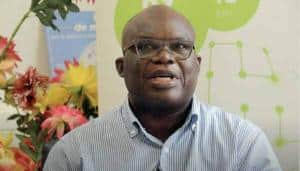
To activate translation, click the “CC” button along the bottom of the video player. Then click the Settings button next to it, select Subtitles/CC, and click on Auto-translate and select the language you want to read captions.
Pour activer la traduction, cliquez sur le bouton “CC” en bas du lecteur vidéo. Cliquez ensuite sur le bouton Paramètres à côté, sélectionnez Sous-titres / CC, puis cliquez sur Traduction automatique et sélectionnez la langue que vous souhaitez lire les sous-titres.
Tools for the clinical examination have not fundamentally evolved since the invention of the stethoscope by René Laennec in the nineteenth century. However, three decades ago, the medical community started to consider repurposing ultrasound scanners to improve physical examinations. Adequate training programs are required to change the clinical examination paradigm, but a broad community of health care professionals could not be created due to the very high price of portable ultrasound scanners available on the market. In this paper, we study an open-source Medtech community that aims to improve diagnosis orientation in hospitals and medically underserved areas worldwide. They are designing an echo-stethoscope -a portable ultrasound scanner- that would be affordable in low and middle-income countries. The variety of expertise pooled to achieve this objective puts this knowledge common (KC) at the crossroads of open source software, open-source hardware, and medical communities unique. Unlike typical KC outcomes, an ultrasound probe is a physical object. Development and innovation in the physical world bring social dilemmas that the community has to overcome, in particular, restrictions in terms of openness. Our study uses the Governing Knowledge Common Framework, a modified Institutional Analysis, and Development framework, to untangle the interactions between resources, participants, and governance structures. Our research describes why and how the creation of a physical object subject to medical regulation influences the evolution and governance of the KC. We provide evidence that KCs coupled with effective project portfolio management(PPM), are effective and resilient institutional arrangements in Medtech project settings. They are flexible and scalable enough to protect and grow shared knowledge throughout the product development process.
Les outils de l’examen clinique n’ont pas fondamentalement évolué depuis l’invention du stéthoscope par René Laennec au XIXe siècle. Cependant, il y a trois décennies, la communauté médicale a commencé à envisager de réorienter les échographes pour améliorer les examens physiques. Des programmes de formation adéquats sont nécessaires pour changer le paradigme de l’examen clinique, mais une large communauté de professionnels de la santé n’a pas pu être créée en raison du prix très élevé des échographes portables disponibles sur le marché. Dans cet article, nous étudions une communauté Medtech open source qui vise à améliorer le diagnostic orientation dans les hôpitaux et les zones médicalement mal desservies du monde entier. Ils conçoivent un écho-stéthoscope – un scanner à ultrasons portable – qui serait abordable dans les pays à revenu faible et intermédiaire. La variété des compétences mises en commun pour atteindre cet objectif rend ces connaissances communes (KC) au carrefour des logiciels open source, du matériel open source et des communautés médicales uniques. Contrairement aux résultats KC typiques, une sonde à ultrasons est un objet physique. Le développement et l’innovation dans le monde physique entraînent des dilemmes sociaux que la communauté doit surmonter, en particulier les restrictions en termes d’ouverture. Notre étude utilise le cadre commun de gouvernance des connaissances, un cadre d’analyse institutionnelle et de développement modifié, pour démêler les interactions entre les ressources, les participants et les structures de gouvernance. Nos recherches décrivent pourquoi et comment la création d’un objet physique soumis à une réglementation médicale influence l’évolution et la gouvernance de la KC. Nous prouvons que les KC, associés à une gestion efficace du portefeuille de projets (PPM), sont des arrangements institutionnels efficaces et résilients dans les contextes de projets Medtech. Ils sont suffisamment flexibles et évolutifs pour protéger et développer les connaissances partagées tout au long du processus de développement de produits.
We are a Chapter of the International Association for the Study of the Commons © 2025 All Rights Reserved
4 Responses
Great work. It is interesting to see how to create affordable alternatives of medical equipment in a highly competitive environment. The commons dilemma seems largely to protect the ability of a community to develop an alternative, even if this means to privatize part of the process (industrialization of the product). I can imagine that trust and reputation are important elements in getting adoption of OSH medical equipment. What barriers, besides standards, do the communities experience.
Communities experience limitations in terms of IP; copyright does no protect enough the hardware artifact produced. Usually, it is sufficient if the device has no real market. However, in our case study, there is indeed a market, and the community is struggling to assess various ways to secure their innovation and make it available to the largest number.
Interestingly another limitation was the bylaws of the association supporting the common. They were too open and became an impediment to the successful development of the solution. Typically by becoming a member, you had a right to vote during the annual board of the association. That could lead to a potential coordinated hostile takeover of the association: its assets and purpose. The membership process has been secured and is now subject to approval.
This is interesting Pascal.
Are there civil society actors who are trying to challenge the regulations that impose the ‘privatization’ of open source hardware in the medical field?
Not that I am aware of, although regulatory bodies are very aware of the phenomenon and during the COVID crisis made sure open hardware innovation made it though the hospital.
For sure it will help to change the paradigm.
Moreover, for few year 3D printed simple medical accessories can be ‘compliant’ with medical regulation, this fiedl is progressing very fast.
Comments are closed.